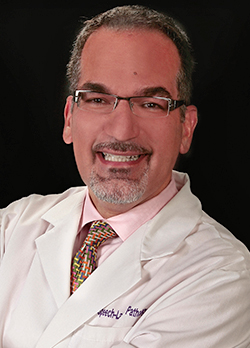

 |
||
|
Associate Professor of Speech-Language Pathology
School of Health Sciences and Practice
Luis F. Riquelme, Ph.D., CCC-SLP, BCS-S, is equally passionate about caring for patients and his role in preparing the next generation of speech-language pathology (SLP) clinicians. Dividing his time between the classroom and the clinical setting, Dr. Riquelme thrives on solving the diagnostic puzzle, and developing creative treatment strategies, especially for patients with complex and critical needs. His field allows him to be a caring provider, a valued member of a medical team, an administrator, a leader and a teacher.
Beyond his day-to-day work with students and patients, Dr. Riquelme is continuously advocating to prove the value of SLP in acute care clinical settings, and improve policies that support ongoing work for persons with communication or swallowing disorders. His advocacy in this area has gained him national and international recognition.
Tell us a little about your own personal journey. What motivated you to pursue a career in speech-language pathology and what were some highlights along the way?
I see the speech-language pathology profession as the perfect merging of medicine, art and education. From the moment you first see a patient, regardless of age, you begin putting the puzzle together to reach a communication or swallowing diagnosis. Then, once you have an idea of what’s going on, you have to creatively figure out how to help the person. That’s where the art comes in. As you mix physiology with behaviorism, you need to be imaginative, inventive and inspired.
What do you consider NYMC’s greatest asset for its students?
Although we offer an outstanding curriculum taught by true experts in each subject area, the SLP faculty are always looking for ways to improve the learning and developmental experience for each student. One example, and a very unique aspect of the NYMC speech-language pathology program, is that our first-year students complete an acute care five-week rotation so that by the time they begin their externships, they’ve been exposed to populations in acute care facilities, some of whom have very complex conditions.
What is a typical day like for you?
There is really no such thing as typical. On Monday and Wednesday, I’m on the NYMC campus to teach, mentor, advise and supervise graduate students. On the other days, I am at New York-Presbyterian Brooklyn Methodist Hospital supervising our students, collaborating and leading the eight-clinician speech-language pathology clinical team, and conducting research. This schedule makes ten-hour days quite satisfying—and all for the benefit of our patients—making every day a joy.
What is the most fascinating part of your job?
That question is difficult to answer because there are many different aspects to my job—and they are all quite fascinating. I love direct patient care, and I learn from my patients on a regular basis.I work with older adults with swallowing or communication disorders, and there is nothing more satisfying than identifying their problem and helping them get better. I also thoroughly enjoy seeing my clinical team at the hospital develop as outstanding clinicians and supervisors, especially since most are former students. In addition, seeing our NYMC students begin their externship and grow clinically in a matter of a few weeks is an incredible feeling.
What achievement have you been most proud of during your time at NYMC?
I’m quite proud of the many different ways we’ve evolved the curriculum to create one of the most outstanding medical speech-language pathology programs in the country.
A recent achievement is creating our new post-graduate certificate program in pediatric dysphagia, which focuses on feeding and swallowing disorders in newborns, toddlers and children. We are on our second semester of the three-semester program. It’s the first in the country and it is very exciting!
It seems like you may rarely have free time given your busy schedule and your advocacy work. When you find yourself with downtime, how do you relax?
I have always loved dancing. For me, listening to great music while moving in rhythm is the best way to unwind. And you can’t beat it for exercise. Lately, I’ve added meditation to my routine, which I also deeply enjoy.
What is the most important piece of advice you can give incoming SHSP students?
I always tell my students, “Being a mediocre clinician is not an option. If you’ve decided to be a speech-language pathologist, then our mutual goal is to make you the best that you can be.”